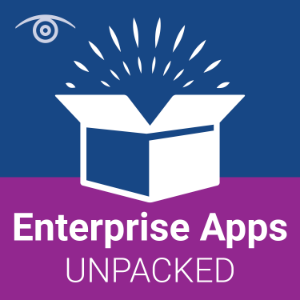
Enterprise Apps Unpacked
Technology Podcasts
What separates successful enterprise technology implementations from costly failures? Here on Enterprise Apps Unpacked, we’ll do a deep dive into strategies that actually deliver results.
Every other Monday, veteran IT journalist David Essex interviews corporate leaders, industry experts and vendors—the people who are truly in the know—about important developments in ERP, HR and supply chain systems and the other applications that run the business. For business and IT leaders, these conversations cut through the chatter to help them make smart decisions about how they buy, deploy and use enterprise software.
Location:
United States
Description:
What separates successful enterprise technology implementations from costly failures? Here on Enterprise Apps Unpacked, we’ll do a deep dive into strategies that actually deliver results. Every other Monday, veteran IT journalist David Essex interviews corporate leaders, industry experts and vendors—the people who are truly in the know—about important developments in ERP, HR and supply chain systems and the other applications that run the business. For business and IT leaders, these conversations cut through the chatter to help them make smart decisions about how they buy, deploy and use enterprise software.
Language:
English
Website:
https://erpconfab.podbean.com
Email:
jcush@techtarget.com
Living up to the hype: Lessons from IoT supply chain wins
Duration:00:22:15
Google union organizer on AI job impact, working conditions
Duration:00:43:12
AI could save manufacturing from the baby boomer exodus
Duration:00:33:10
How AI-driven digital ecosystems can improve sustainability
Duration:00:33:48
Is AI-powered search the new corporate learning powerhouse?
Duration:00:26:21
Can industry process models fix the agentic AI data problem?
Duration:00:29:33
Can you really trust AI with procurement tasks?
Duration:00:33:50
How EY is training employees to use AI
Duration:00:26:17
Is geospatial data the real game changer for digital twins?
Duration:00:33:14
Introducing our new podcast: Enterprise Apps Unpacked!
Duration:00:01:57
SAP makes case for integrated “flywheel” of AI, data and applications
Duration:00:26:47
Developing products with spatial computing and virtual twins
Duration:00:40:38
Agentic AI from Salesforce and Oracle: The new leading edge of ERP?
Duration:00:35:59
Blackline CIO on the Customer Zero approach to AI
Duration:00:27:51
SAP in 2025: S/4HANA, cloud pressure builds
Duration:00:32:55
Sentient documents, anticipatory interfaces and the next UI
Duration:00:32:36
How AI can improve ethical sourcing and sustainability
Duration:00:24:02
Oracle Cloud Infrastructure and the ERP wars
Duration:00:36:22
Using AI, robots and analytics to improve warehouse visibility
Duration:00:30:28
AI-enabled digital twins for smarter healthcare
Duration:00:22:58